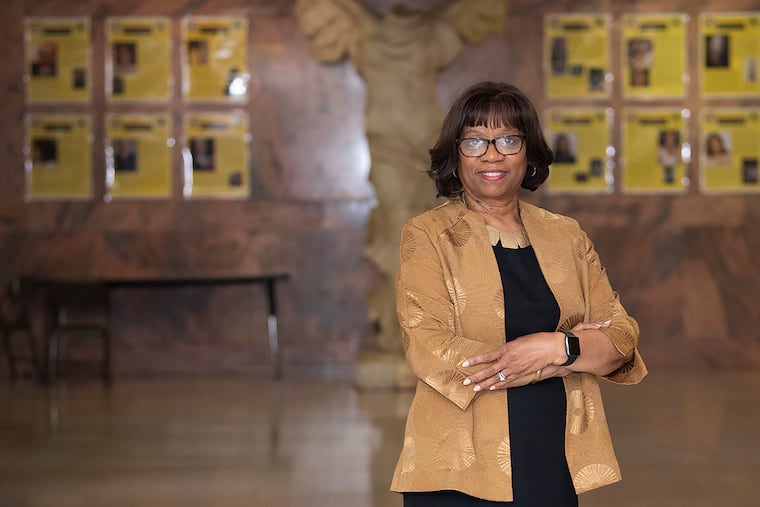A ‘forever teacher’ retires as principal of Philly’s storied Girls’ High
“I’m still jumping double dutch. I get on the dance floor on proms. I introduce myself to all the dates. I must know everybody,” said Parthenia Moore, principal of Girls’ High.

Fifty years ago, Parthenia Moore’s mother made a decision that shaped the course of the young girl’s life.
A South Philadelphia kid, raised at 18th and Morris, Moore banked on attending South Philadelphia High, like all of her friends from Vare Junior High. But Shirley Wilson-Moore had lofty dreams for her bookish oldest daughter, and Southern was not to be.
Moore attended Philadelphia High School for Girls, the storied magnet school at Broad and Olney with competitive admissions criteria, where academic excellence was expected and young women were told there were no limits to what they could achieve.
The school, which opened in 1848, was one of the nation’s first public high schools for girls. Its students often have gone on to become judges, doctors, and other women of note. They include Gloria Allred, Constance Clayton, Jill Scott, and Judith Rodin.
“It was the best decision my mother ever made for me,” said Moore. “The sisterhood has meant everything to me.”
In June, Moore will retire from a nearly 40-year career as an educator, and from a job that has been the highest honor of her professional life: principal of her alma mater.
Since 2010, Moore has presided over the school in her signature style: formal, but enthusiastic; firm, with high standards and ready hugs for the 850 young women Girls’ High educates.
“Phenomenal young women, where should we be?" Moore called to a group of girls relaxing in the school’s pink marble hallway on a recent warm spring day. The girls smiled sheepishly at her and scattered. After all, this is the principal who reminds them that people see them before they hear them, who cares about the way they walk, talk, and dress.
Moore gets choked up when she talks about what her students mean to her.
“The girls are my daughters,” she said. “They are self-determined to be and to know and to grow, and they have confidence. They amaze me with all they bring to the table.”
Moore said she was inspired by educators who believed in her, and has sought to do the same. She graduated from Girls’ High in 1971, earned a degree in education at Pennsylvania State University, then returned home to Philadelphia to teach at Rhodes, Cramp, and Francis Scott Key schools.
For years, she balanced teaching with raising her two sons, but also pursued a master’s degree at St. Joseph’s University and a doctorate at the University of Pennsylvania. She worked as a district principal and a central office administrator, taking to heart the message given to her by Clayton, the former Philadelphia superintendent: Your job is to serve Philadelphia’s children.
When Moore was appointed principal of Girls’ High, one of the first things she did was to walk inside her new office, shut the door, and run her hands over every item in the room — the conference table, the cabinets, the imposing desk where former principal Ruth Murray Kline had sat. Moore had admired Kline from a distance, but she was a quiet student who never got called into the principal’s office.
She aimed to be less removed than Kline. She aimed to be a principal who walked the halls and talked with her students in the lunchroom and knew about their college plans. Girls’ High taught Moore to find her voice, and that’s been her aim for her students.
The girls have not let her down. For many, the school proves empowering, their first chance to sit with women in an intellectual space.
“They speak up, sometimes more than we want them to,” Moore said, chuckling. Her office became a boardroom, with students welcome to make presentations to her about a club they wanted to start or a concern they had. If well-researched and feasible, Moore said, the students’ proposals were executed.
And yes, she still has love for the work, even after all these years.
“I’m still jumping double dutch. I get on the dance floor on proms. I introduce myself to all the dates. I must know everybody,” Moore said.
Allene Martin, a Girls’ High senior, said that students appreciate their principal.
“She understands what we’re going through, what it’s like to have that Girls’ High standard to live up to,” said Martin, who’s headed to Anna Maria College in Massachusetts.
“She’ll do anything to help us,” said Martin’s classmate Abria Gaines, who will attend Temple University in the fall.
Moore freely admits that she’s tough. Every Sunday, she would spend an hour or more compiling professional development resources to send to her faculty. Her standards are exacting, and she clashed with some staffers.
“She’s very demanding,” said Joseph Marchetti, a longtime Girls’ High art teacher. “But she loves these kids; she will advocate for them.”
It surprises even Moore that she’s ready to leave Girls’ High, but she wants to enjoy her sons and grandchildren and her new husband, an old friend with whom she had lost touch for decades and met again by chance.
Moore will focus on teaching at the college level, which she’s done for several years. She will have more time for travel. But her heart, she said, will always be at Girls’ High.
“I am,” Moore said, “a forever teacher.”